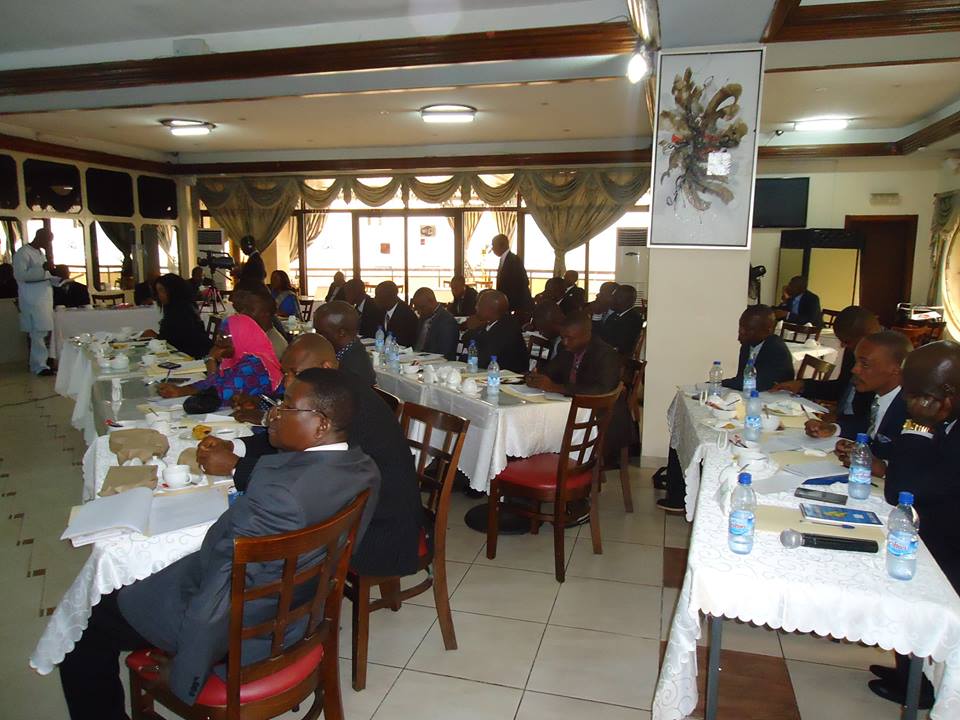‘I would advise that after today’s workshop, steps would be
taken to make the Guide a Statutory Instrument for it to have the force of law
and bind all accredited legal aid providers. I would enjoin all participants to
go through the draft Legal Aid Guide meticulously so as to make it a very good
instrument in the furtherance of the work of the Board and the delivery of
justice in our beloved country.’ Hon. Chief Justice, Abdulai Charm made these
remarks at the endorsement meeting on the Legal Aid Guide held at the Cube
Restaurant on Thursday, August 4.
The Chief Justice intimated that the Judiciary’s continued
involvement and willingness to participate in the work of legal aid
institutions is not accidental rather it is founded on a strong legal basis
because Section 120 of the national Constitution confers all judicial power in
Sierra Leone on the Judiciary which is headed by the Chief Justice.
The Executive Director of the Legal Aid Board, Ms. Fatmata Claire
Carlton-Hanciles said the Guide will go a long way to enhance the effectiveness
and efficiency of the work of the Board in terms of implementing the Act as it
covers the processes and procedures of accessing legal aid. ‘This Guide will
improve the delivery of legal aid and we are hearten the meeting on the endorsement
of the document is taking place at a time when we are expanding our operations upcountry,’
Ms. Carlton-Hanciles said.’
She noted that the Guide has come a long way and seized the
opportunity to thank the partners in the justice sector and organizations which
participated in the workshops to review and finalize the Guide.
The Chair of the Board, Justice Adeliza Showers described the
Guide as an essential part of the operations of the Board. She thanked OSIWA
for funding the workshop. She praised Ms. Memunatu Pratt for her immense
support to the work of the Board.
The Country Officer of Open Society Initiative for West
Africa (OSIWA), Joe Pemagbi said his organization will work with relevant
actors to promote community based primary justice services across the country.
‘Our aim is to work with government through the Legal Aid
Board, MDAs and non-governmental organizations to deploy paralegal and other
community service providers to provide primary justice services in the
country,’ Pemagbi said.
He added that his organization will support the Legal Aid
Board with developing Standard Operational Procedures and work with the Board
to sign cooperation agreements and provide grant making support to
non-governmental organizations providing services. He noted that his
organization will support the popularization and distribution of the Guide to
legal aid providers, stakeholders and communities after it has been passed into
law.
 Ms. Memunatu Pratt presented the Legal Aid Guide on behalf of
the Technical Working Group which was set up to review the recommendations of
the two-day validation workshop to finalize the Legal Aid Guide for the
attention of the Board.
Ms. Memunatu Pratt presented the Legal Aid Guide on behalf of
the Technical Working Group which was set up to review the recommendations of
the two-day validation workshop to finalize the Legal Aid Guide for the
attention of the Board.
Ms. Pratt talked the participants through the recommendations
which have been incorporated into the Guide. This includes the following: The Board to decide on the establishment of a
Guidance and Counselling programme, set up a Court Monitoring Team, paralegals
and interpreters should be fluent in the local languages of their respective
community to assist applicants to fill forms annexed to the guide, the Board to
encourage young legal practitioners to work on behalf of the Board and an
in-service training manual should be put together for paralegals and other
legal aid organizations.
The meeting was climaxed with the endorsement of the Guide by
the Board and management of the Guide after the consultant to the Board, Mr.
Francis Gabbiddon talked them through the various parts of the draft Legal Aid
Guide 2015.
By: Joseph Dumbuya.



Comments
Post a Comment